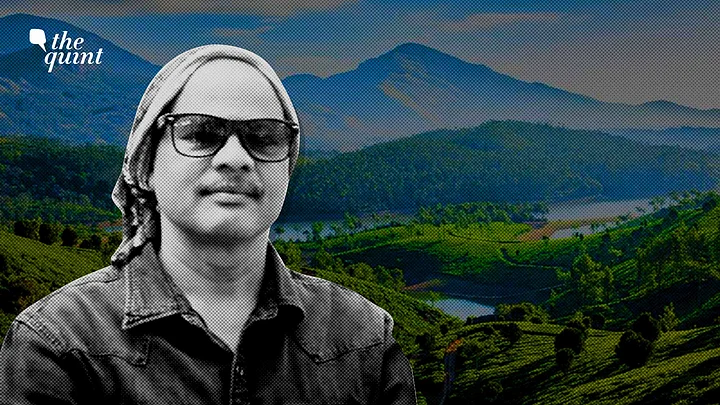(If you feel suicidal or know someone in distress, please reach out to them with kindness and call these numbers of local emergency services, helplines, and mental health NGOs)
A week ago, KV Jayapalan visited his brother-in-law Narayana Swamy and shared he was disheartened that his pleas to save the Western Ghats were falling on deaf ears. The activist then left to Akkamalai in Valparai in Tamil Nadu, where he had first realised that climate change was affecting the life-preserving Ghats at a pace that was shocking. Sitting on the hill, overwhelmed by the beauty of nature around him, he penned a 10-page suicide note.
“The weather patterns and seasons are erratic in the Western Ghats. We can’t take the Ghats, our mother, to the operation theatre and get her fixed immediately. We have to correct ourselves to help save her. Just like how a criminal on death sentence is asked for a last wish, I hope this last wish of mine is considered for the sake of our mother,” read his note.
The 53-year-old Jayapalan consumed pesticide on Saturday, 7 January, at his home. He was rushed to a hospital, where he breathed his last on Sunday, 8 January. He left behind a suicide note that accused the Kerala government of abetting the destruction of the Western Ghats by taking a stand favourable to forest plunderers and land mafia.
Teach Them Young, Jayapalan Wished
Jayapalan was born in Vannamada village on the slopes of Nelliyampathy hills in Kerala, which constitute a crucial portion of Western Ghats. He is survived by his wife Lata, son Jayesh, and daughter Puja.
Growing up, Jayapalan identified closely with the mountain ranges as a life-giving source and was disheartened that nobody could protect the Western Ghats, his family told The Quint.
In 2016, he along with Swamy and others had started a collective called Green Guards of India, that focused on facilitating the coexistence of Tribals and wildlife in this region. The Western Ghats is an extensive region spanning over six states, 44 districts and 142 taluks and hosts India’s richest wilderness in 13 national parks and several sanctuaries. Jayapalan was also active in the Plachimada agitation, in which the affected local community fought against the aerated drinks major Coca-Cola, which allegedly depleted their water resources.
Recollecting the last conversation he had with Jayapalan, Narayana Swamy said, “He was very depressed that he was unable to convince the government to make policy changes that can change the future of the Ghats.” Jayapalan had recently submitted several petitions to the Kerala government stating that lessons on the preservation of biodiversity and erosion of land in the Western Ghats should be included in the school curriculum from pre-primary to high school. He hadn't gotten any response, Swamy said.
‘Jayapalan’s Words Will Inspire Us to Keep the Fight Going'
His organisation was instrumental in collecting and removing all the plastic waste generated by tourists visiting Nelliyampathy hills in Kerala’s Palakkad, for the last five years. Jayapalan had organised several campaigns in Nelliyampathy to educate tourists and school kids to avoid using plastic.
He had opposed the government for not implementing the recommendations of the Madhav Gadgil committee on the ecological restoration of Western Ghats. The Western Ghats Ecology Expert Panel (WGEEP) designated the entire hill range as an Ecologically Sensitive Area (ESA) and recommended that “no new dams based on large-scale storage be permitted.”
Jayapalan had accused in the past that people with vested interests had created a lot of misconceptions around the report, blaming it for being "anti-farmer and anti-people" leading to its rejection.
He claimed in his suicide note that despite the Western Ghats being recognised by UNESCO as one of the world’s eight most important biodiversity hotspots, it is being neglected by the people in positions of power. These forested hills are source to numerous rivers, including the Godavari, Krishna and Cauvery and act as a huge water tank supplying water to six states.
“The tourists who throw plastic water bottles in these beautiful places in nature don't seem to realise that the same plastic is flowing to the dams and then to the taps that provide water to their homes. How many homes with 3-4 people have concretised their 2,000 sq ft homes without any synergy with nature? We are choosing development that is against nature and so we are not progressing and are, in fact, regressing. Not growing but destroying," the note read.
“We live in her lap and yet we are not able to understand how important she is to our existence. Western Ghats is our mother who nourished us and took care of us. People should be educated to understand that the Western Ghats is as important as one’s own birth mother. I’ve tried satyagraha and every other form of protest and so I am sharing this as my last request to you all.”K V Jayapalan Before His Death
Environmentalist S Guruvayurappan termed his death a severe loss, especially when the buffer zone issue was becoming a matter of intense debate.
“The Western Ghats has also died a little with the death of Jayapalan. It is the innate humanitarian nature to serve Mother Earth and strive for change. He wanted to control the impact of climate change with concerted efforts. But he knew all is not in our hands and we have to rely on governments to step up. Jayapalan’s words will continue to serve as an inspiration to keep the fight going. Even as an individual we can make a difference,” he added.
(At The Quint, we question everything. Play an active role in shaping our journalism by becoming a member today.)
